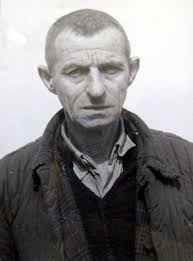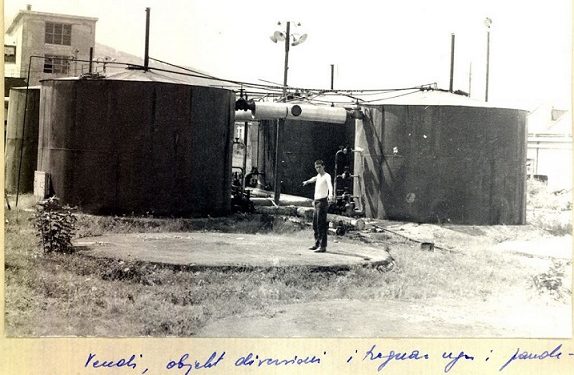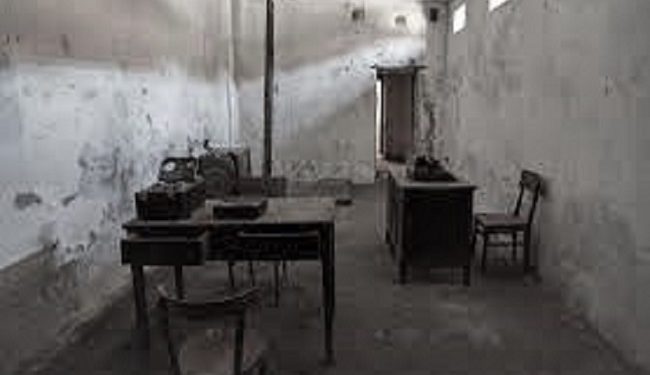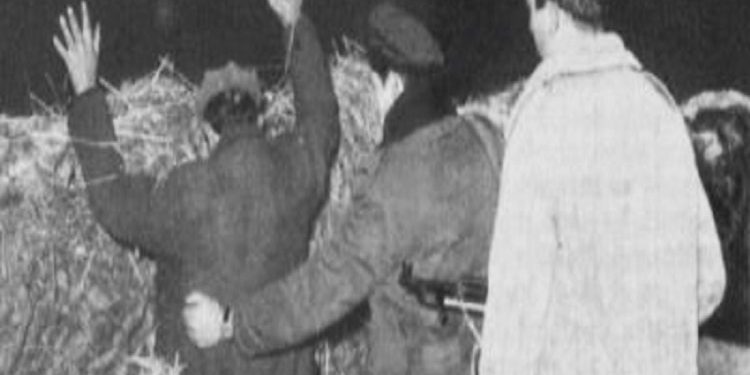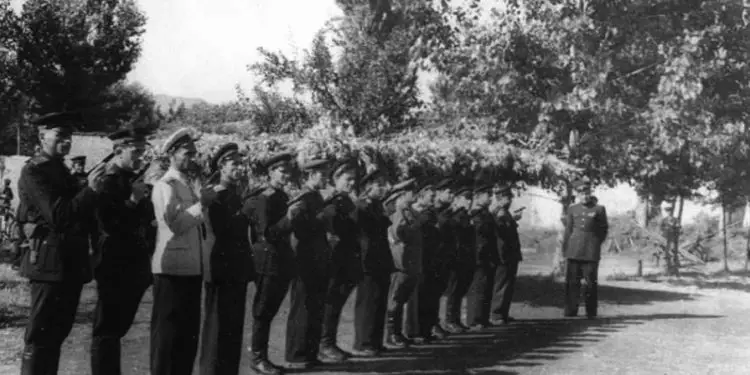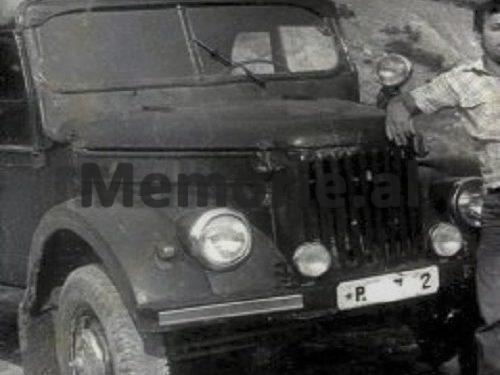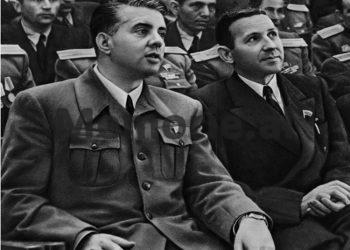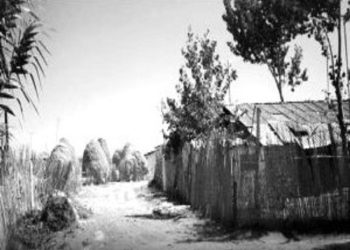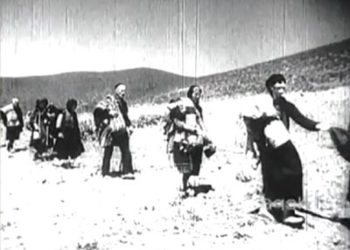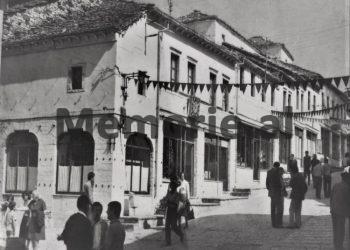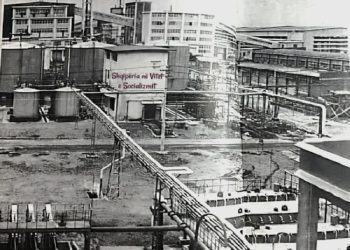Memorie.al/“From our clan, we have 3 executed by firing squad, 3 dead in prisons, 13 convicted with 249 years in prison, simply because we were wealthy and affiliated with the ‘Balli Kombëtar’ (National Front).” – Memorie.al / “We were a large family with 36 members before 1945, joining other large families of those years, where the wealthy and middle-class families in their mansions managed to organize life in a group-family and society. My father had eight sons and two daughters, so we were 10 children who, along with my uncle’s sons and other first and second cousins, grew up together and worked in the fields and wherever the work demanded it. Although we were children, no one was idle; some worked in the fields, some with livestock, some at school, even though the latter were scarce. My father, Tahiri, had properties that he had acquired through the sweat of his brow, but the majority of this property was inherited from his father, my grandfather. He inherited an area of 670 dynyms of land, as well as over 260 olive trees, about 300 dynyms of pasture, and hundreds of fruit trees, such as pomegranates, apples, plums, figs, etc.”
These were the opening words of Murat Protoduari, the 85-year-old who, for many years, carried on his back a significant part of the suffering – a suffering that has left its marks on him, his family, and his clan. Murat suffered 12 years of political imprisonment and narrowly escaped an extrajudicial execution in the middle of a July night in the early 1980s, simply because he was the brother of a Ballist, the son of a nationalist, the grandson of a patriot from a family with nationalist origins, and because he came from a wealthy family, nothing more.
From the very beginning of his testimonies, Murat Protoduari openly stated that no one from his family or clan had dirtied their hands with blood, nor were they spies, but they were bread-givers, benevolent people, and patriots.
“Our large family,” Murat continues his testimony “was also involved in livestock farming. We had a flock of more than 500 heads of small livestock (sheep), 20 heads of cows and buffaloes, a few oxen, two or three pack animals, as well as two horses for riding, and we had not neglected trade, which our parents conducted in the cities of Lushnjë, Kavajë, Fier, and the towns of Berat and Vlorë. In these cities, the people of my clan traded agricultural and livestock products, as well as products from fruit trees, olives, grapes, etc.
We were a wealthy family, a wealth that we had acquired through work and sweat, over generations, accumulating from year to year, son after son, and heir after heir, inherited wealth, accumulating our labor and working up to 18 hours a day, along with our farmhands (hyzmeqarët), whom we treated like family members. To cope with all this work in agriculture and livestock, we had hired laborers, shepherds, field workers, plowmen, traders, etc.
Our large family also had families of farmers, but not in a bad sense, as my grandfather and father treated these people the same as the other families in the village. In fact, my grandfather and later my father made them owners by donating property, a house, and some small livestock. The wealth, which my father knew how to manage well, was inherited from his father and grandfather, but also from my great-grandfather, as our family, or rather our clan, has lived on those lands for over 250 years and still resides there today.
My great-grandfather was a patriot and a very popular man in the region of mesit të urave (between the bridges). In political terms, my father was a fervent nationalist, and our house was a center where, often before 1945, the exponents of the ‘Balli Kombëtar’ from Myzeqe and Mallakastër would gather, such as; Xhemal Dyli, Veli Malasi, Myrto Malasi, Jakup Salçi, Kadri Cakrani, Hysen Hekali, etc.
Although our house had played a major role in the fight against the occupier, where my brother, Aliu, and my uncle, Sakoja, participated with weapons in hand in the war against the occupier—in fact, my brother was enlisted in the ranks of the Balli Kombëtar groups, while my uncle was in the ranks of the Partisan unit until the country’s liberation.
No one thought that you absolutely had to be enlisted with the Partisan units to fight against the Nazi-fascist occupier, as the ‘Balli Kombëtar’ units were doing the same thing; they also fought against the occupier. Today, I can say that one of these wars was that of Gjorm, and several others, which the history of the 50 years of communist dictatorship has despised or left in oblivion, while in these two decades and more after the fall of communism, changes in history are still not being made, which is perhaps deliberate, or due to inattention to react.
Without intending to offend anyone, the changes in history must take a turn earlier than before 1945; so, in my opinion, the changes should start after 1912, where dozens and hundreds of patriots have had their patriotic activity denied, just like the ancestors of my clan. In this case, I can mention one of my grandfather’s friends, Lef Nosi, from Elbasan.
Although we were a family coming from a large clan, even today, we are over 75 families, ranging from first cousins to sixth cousins, and we have always focused on our work. No one was able to give us what we deserved, whether in our moral standing, which they sought to trample upon during the communist years, or in the expropriation they carried out, and which they still have not been able to return to us, neither in goods and land, nor in compensation and moral rehabilitation, nor in compensation for the years they held and convicted us and destroyed us in political prisons. In this caravan of suffering, I cannot fail to mention the ordeal of my sufferings and those of my family and clan throughout the entire communist period.
But let’s return to the end of the war and the liberation of our country. We rejoiced greatly at the liberation of the country, as our clan lived in the village of Poshnjë and was located with houses on the right side of the road, heading towards the city of Berat – that is, on the edge of the national road, Berat-Lushnjë – and the fear of attacks, strikes, and burnings by the occupiers was present. As a clan, we were always at the center of these strikes, so to escape them, we were forced several times to leave our homes and hide in our own forests, at the head of the village, and to send the children to the deeper villages of Shpirag, to our friends. In this movement, we suffered much damage to livestock and agriculture, to crops and fruit trees, but compared to saving our lives, this was the lesser evil.
However, even though we suffered from the Nazi-fascist occupier, even though we fought against the latter along with the Partisans and the Ballists, even though we were burned by his soldiers, even though we helped our fighters, without distinction of party, religion, or region, after the liberation of the country, we were scorned, killed, and persecuted, as if we were the occupier itself. Thus, our endless suffering began, suffering for which there was no end, and which concluded with arrests, imprisonment, killings, and deaths in the places of punishment.
Misery and suffering began during 1944-1945. The ordeal of persecutions, confiscations, prosecutions, and political imprisonments, and finally, the executions and murders of people from our clan, truly began in our family. And this horror cost the Protoduari clan 3 killed, 3 dead in the places of punishment (prisons), 13 imprisoned, sentenced to 249 years in prison.
But the ordeal of suffering would not end; it would last for almost 50 consecutive years, non-stop, day by day, month by month, and year by year – suffering that, even though we gained freedom after 1990, we will never forget, because the loss of people can never be compensated, nor can the moral suffering ever be replaced. We continue to feel that suffering and loss of people even today, and even though more than two decades have passed in democracy, we still have not recovered.
The Beginning of Tragedies and the Final Break with Communism
The first murder and tragedy, as we call it in our parts, began in 1944, when the first murder of our brother, Aliu, was committed by Partisan forces, by Zylyftar Veleshnja’s unit in an armed clash, in a village of the former municipality of Fier. The murder occurred when the Communist Party started the contradictions and disagreements with the organizations and units of the ‘Balli Kombëtar’ – contradictions and disagreements that led to war between them, disagreements that led to brother killing brother, where many Ballists were killed, who, in fact, had done no harm to anyone, except that they did not agree with the ideas of the communist units, which from the beginning wanted to have power themselves and command alone.
For them, the ‘Balli Kombëtar’ units only had to obey them and nothing more; thus, the agreement between the ‘Balli Kombëtar’ and the Communist Party, the famous Mukje Agreement, was broken. The murder of Aliu, our brother, in 1944, when he was only 40 years old and had 5 children, was heavy for our clan, which had no less than 50 men. This murder separated us once and for all from communism and its twisted ideas, as it cut short the continuation of our path, which now, after 70-something years, we are continuing again. Anyway, let’s return to that grave event. I remember well that, as a clan, we went to the place where my brother was killed to retrieve him, and we did not find him.
Later, we learned that the brother, along with several other young men enlisted in the ranks of the ‘Balli Kombëtar’, had been killed and placed in a pit, dressed and all, and what was worse, the Partisan unit had instilled fear and terror in the villagers, so that the latter would keep secret the pit where several Ballists killed by them were buried. So, in a way, they were threatened with murder and burning, any resident who would reveal the grave of the Ballists. All this that I am telling, we learned from an elderly person after 1990, when we went back to that village to search for my brother’s remains, which we found along with those of several other Ballists in a single pit – dozens of young men killed.
I remember well that in that pit, we found these young men killed and thrown there like animals, folded one on top of the other, truly a murderer’s killing. The division between the Communist Party and the ‘Balli Kombëtar’ deepened even more ideologically. While the ‘Balli’ favored an alliance with the West, communism was set on moving towards the East, whence those cursed ideas came, which would separate us for 50 years from our people.
Perhaps now it seems unbelievable or even ridiculous, but a brother dared not visit his brother, a brother his sister, a nephew his uncle (maternal or paternal), because the communists, in order to rule and have eternal power, started the cursed class struggle, labeling and tagging people as “kulak,” “reactionaries,” and who knows how many epithets they applied to achieve their goals.
Based on these epithets, persecutions, prosecutions, and unmasking’s in neighborhoods, villages, and wider areas began, followed by extreme measures, such as imprisonments and internal exiles from city to village and from village to village. Such merciless actions will not be found in any other regime. However, let’s return to the liberation of the homeland, something the ‘Balli’ had also fought for.
And while Albania was liberated (or rather, the War had ended, because it was not liberation), which all the people were rejoicing about, for our families and clan, the endless persecutions began. In 1945, at the age of 73, my father, Tahiri, was arrested, and without any trial, he ended up in prison, without knowing what he had done, without any accusation, just because he was the father of a killed Ballist and had many properties and had to be labeled a “kulak,” because he had to surrender all the goods and wealth he had accumulated throughout his life.
On the same day, he also had to leave his homes, as if the newly arrived rulers with the red ideas of Russia had built them. My father was handcuffed and died in June 1948, in Burrel prison, three years after his arrest, without having seen or met anyone from home. We found his remains inside the walls of the Burrel prison camp, behind the cooking kitchen (the dictators were afraid that even the bones of the dead would escape from prison). Along with his remains, we also found the remains of dozens of other prisoners who had died over the years and were buried in the same mass grave.
During the search to find our father’s remains, we also found the remains of Sabri Qamo and Fuat Ushtina, but we could not retrieve the latter. Fuat Ushtina had two daughters, and they did not have the financial means to retrieve their father’s remains, so even today I recall with pain that situation, where these girls, even though they won the most precious thing, freedom, they (the two daughters), due to extreme poverty, could not retrieve their father’s remains to bury them where they lived.
This was another great pain for them and for me, but such cases were not uncommon throughout Albania in those first years after the fall of communism. There were also other families who could not retrieve their relatives due to economic reasons, and still no one is helping them find the remains of their relatives.
This is a separate story, just like that of my brother Aliu, whose remains were found in Kallmë of Fier at the municipality. When they exhumed my brother’s remains, we saw that there were others too, buried in a single grave, after being killed by the Partisan units, which their relatives later retrieved. We buried my father and Aliu, my brother, in the village cemetery, along with Luftari, my nephew, killed in 1978, whose remains we found in Vodica of Berat, in the mass grave by the Osum river, in the middle of the bushes.
Luftari was killed in 1978, along with Riza Hazizi, with the accusation of being “enemies of the people,” allegedly because they were going to blow up the “Mao Ce Dun” Textile Combine in Berat, while Sako, convicted for agitation and propaganda (he said that; “my son does not know where the Combine is located, let alone blow it up”). Thus, the father of Luftari, Sako, sentenced to 20 years in prison and who also died in prison, we found his remains in the cemetery of the village of Panahor of Aranitas in the Ballsh district, after he died in prison, at the age of 78.
Sufferings and Confiscations
The sufferings of my family and clan are endless. After my father’s arrest, the “Agrarian Reform” began, where the land and all assets were confiscated, unbearable taxes were imposed on us, we had nothing to sell, nowhere to live, as they evicted us from our homes, we had no bread to fill our stomachs, while they demanded millions of gold Napoleons from us, as if we had great wealth and not the property of our clan, in a village that had other families and clans just as wealthy as ours. As I said earlier, I want to say again that in May ’45, they took my father, Tahiri, 78 years old, arrested in Berat, and along with him, my mother, Bajamja, 75 years old.
Three days later, the communists released my mother, who traveled on foot all day to return home to Poshnjë, 22 km on foot, away from the city of Berat. As soon as she arrived, my mother could not speak; she lay down never to get up again. Meanwhile, after the inhuman torture of my father, they managed to take the property that my father had hidden somewhere in the house. On that day, they brought my father to our house; he could barely stand from the tortures, visible on his face with hematomas, where he also complained of pain in his body and limbs, his hands and feet bound with chains.
The Police and the State Security, after a detailed search, took whatever they found, and after that meticulous search, they also found the deeds of the immovable properties, which were land, plots, dwellings, etc., and they burned these found papers, which were only documents, in front of the house and took my father with them, never to return until 1948, when my father died in Burrel prison, and to return to the place where he was born and raised, after 50 years, now deceased.
Meanwhile, my mother lived only 7 months from that day, languishing in bed, often saying that she could not lift her head when she saw them torturing my husband, asking him only for money and gold, and that they hit me too, in his presence. They were separated in the police station amidst tortures, never to meet again, and now that I tell this, I do not know to whom we owed that the communist police would torture my innocent father and mother.
That honor and great moral strength that my mother had, died within 7 months of my father’s separation. On the other hand, my father never learned if my mother was alive or dead; no one allowed us to come and meet him in Burrel prison. He died separating from my mother in the Internal Affairs Branch, tortured by the Forces of the Defense Division, as the defense forces, newly emerged from the war, and was called at that time. Memorie.al




